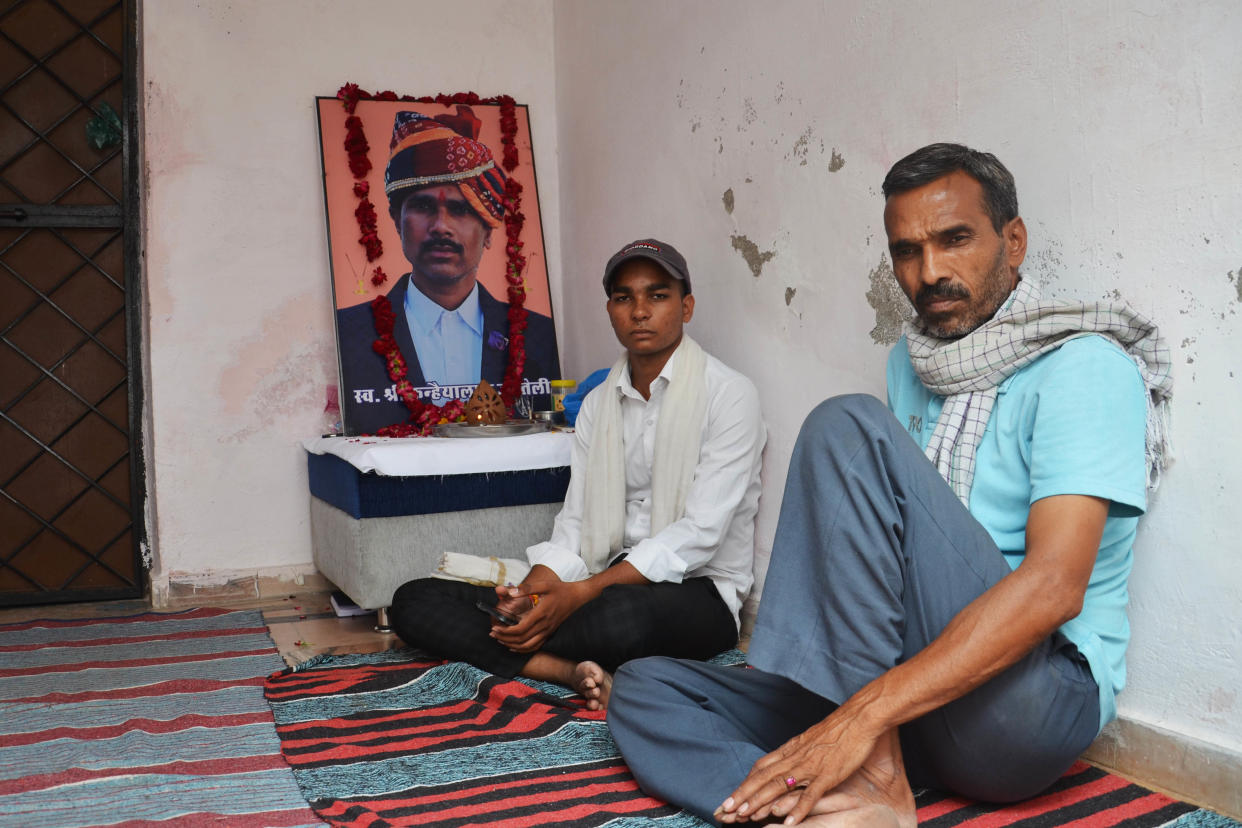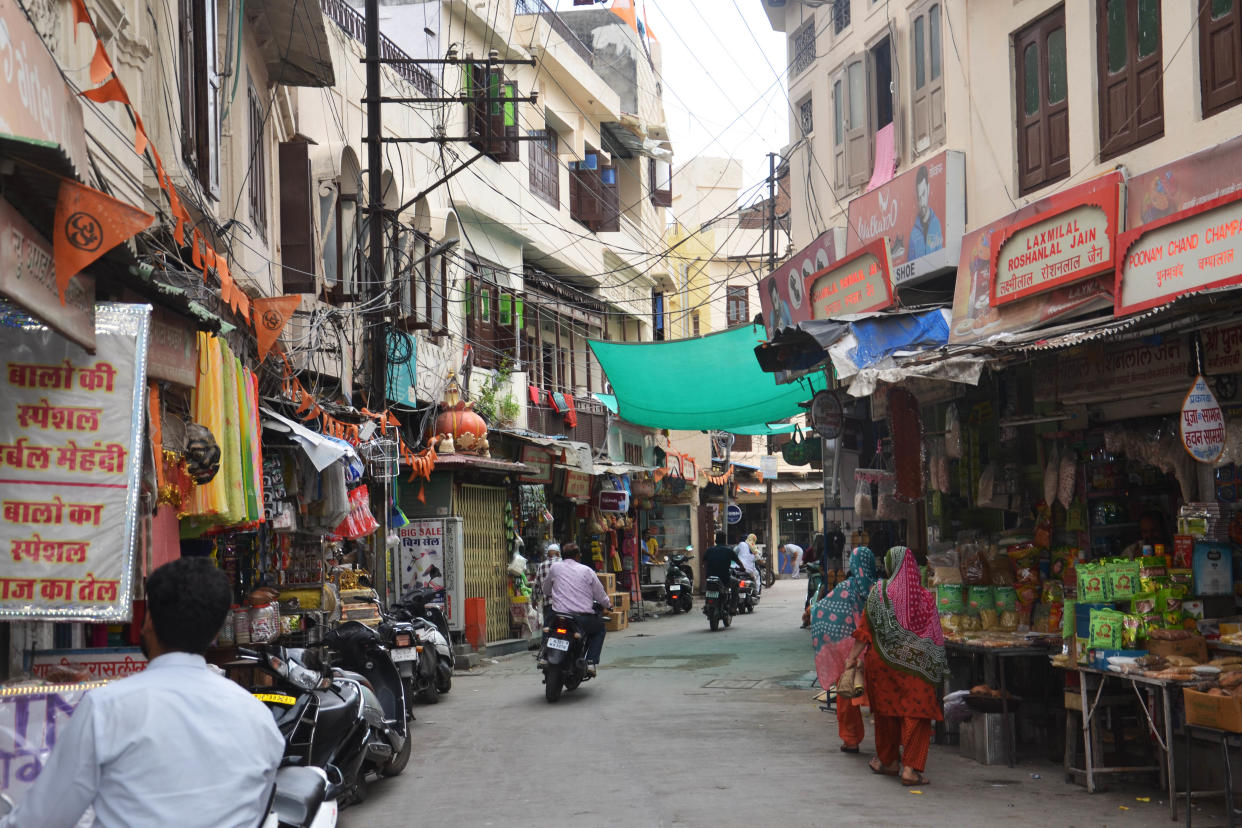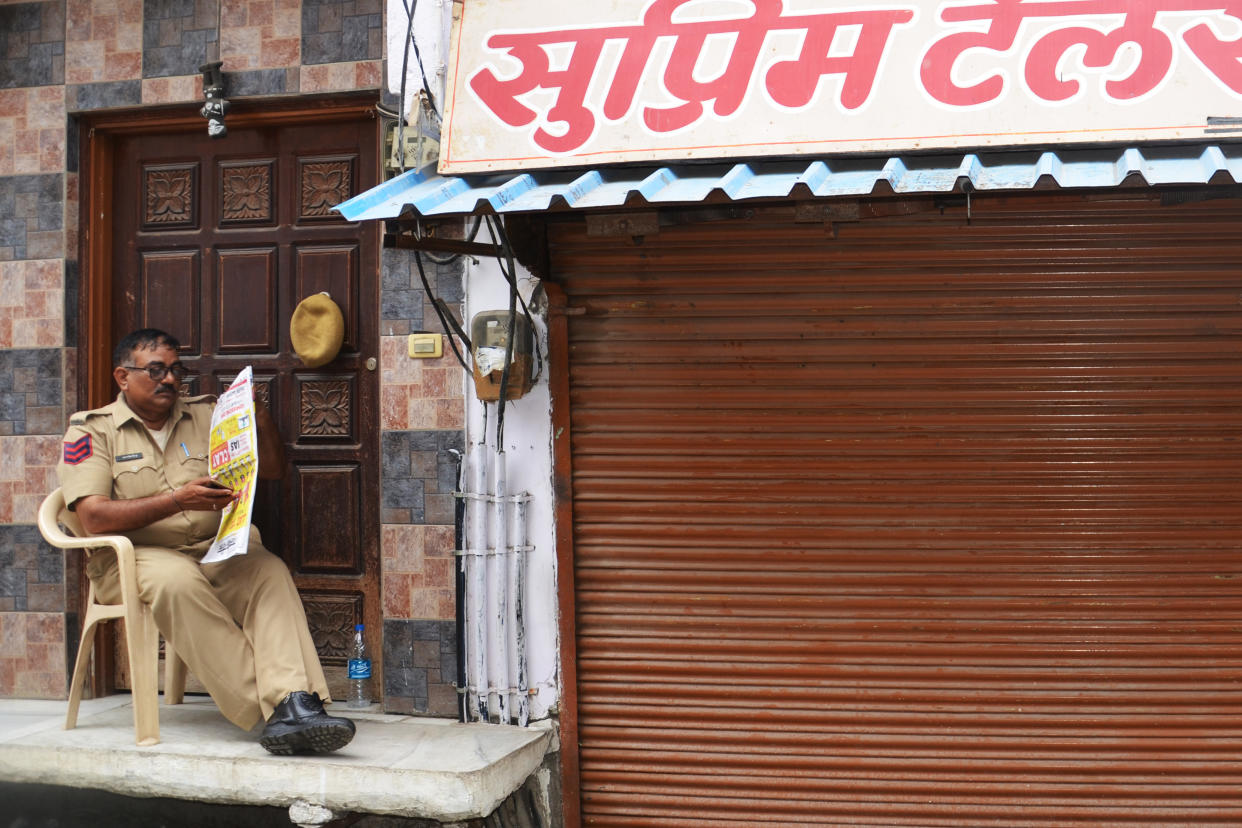Gruesome murder in India stirs fears of escalating religious violence
UDAIPUR, India — For 20-year-old Yash Teli, memory is a curse. When he closes his eyes, he can see his father’s bloodied body lying in the street, his throat slit.
Sitting in a room full of mourners on a recent afternoon in Udaipur, India, next to a large photograph of his father that was draped with a garland of roses, he was reminded of the blood.
“I don’t want to remember him like that,” he said as his mother’s wails could be heard from another room. “How will I ever sleep now?”
Udaipur, a city of about 600,000 in the western Indian state of Rajasthan, has been a tinderbox since the gruesome slaying last month of Yash’s father, Kanhaiya Lal Teli, a Hindu tailor. In a video posted online by his attackers, identified by police as two local Muslims, the elder Teli can be seen in his shop measuring a man who then attacks him with a cleaver, joined by the man filming. They later accused the tailor of insulting Islam.
The killing shocked people across India, a majority-Hindu country of 1.4 billion, where religious violence is more often aimed at Muslims amid rising discrimination experts say is fueled by the Hindu nationalist Bharatiya Janata Party government led by Prime Minister Narendra Modi.
Shamseer Ibrahim, a 36-year-old Muslim activist, said that state endorsement of anti-Muslim violence was damaging the democratic and secular values of India, whose long history of interreligious co-existence has been punctuated by bloody outbreaks of strife.
“Under the Modi regime, the spirit of the Indian Constitution is being diminished,” he said in a phone interview. “A very dangerous future awaits Indian society.”

‘They don’t have a right to live’
Yash was in the Udaipur market the evening of June 28 when he got a phone call from his cousin: “They have done it. They killed him.”
India, a regional power growing closer to the United States, had been tense for weeks after two top BJP officials made derogatory remarks about the Prophet Muhammad, the ancient founder of Islam, and his wife Aisha. The remarks drew protests across the country and diplomatic outrage from the Muslim world, leading Modi and the BJP to distance themselves from the officials.
Days before he was brutally killed, Kanhaiya Lal, 46, was briefly detained by local police who accused him of “hurting religious sentiments” by expressing support online for the anti-Islamic remarks by the BJP officials. In a second video posted after the killing, his attackers cited his social media comments, which the tailor had later deleted. They also threatened a similar attack against Modi.
Police have identified the assailants as Ghaus Mohammad and Riyaz Akhtari, both residents of Udaipur. The two men are in the custody of the National Investigation Agency, India’s premier anti-terrorism task force, and have been charged under the country’s anti-terrorism law. NBC News was unable to reach their attorneys or ascertain whether they had entered any plea.
On Maldas Street in Udaipur’s old city, outside the shop where Kanhaiya Lal had worked as a tailor for 15 years, his body lay in a pool of blood as protesters gathered in huge numbers, taking pictures and expressing outrage. Yash, the older of his two sons, couldn’t bear to look at his father’s body under the cloth that covered it.
After the killing, authorities quickly imposed a round-the-clock curfew across Rajasthan, which with 69 million people has a population almost as big as that of Britain. They also suspended internet services in an effort to stem the spread of the videos, fearing they could further stoke tensions.
The killing has been widely condemned by India’s Muslim leaders, who say it violated the tenets of Islam. But Hindu nationalist protests around the country have been rife with anti-Muslim speeches and slogans, and even calls for violence.
Speaking to cheers from the room at his father’s wake this month, Yash called on Hindus to arm themselves against what he sees as a growing threat.
“I realized that there is no democracy in India. It is ruled by Islamists,” he said in anguish, a statement at odds with the fact that Hindu nationalists are in power. “They don’t have a right to live. Cruel people like them should be killed.”
“Us and them” attitudes are nothing new in India, which has long struggled with religious, ethnic and linguistic divisions. But critics say that under Modi and the BJP, the conflict between Hindus and Muslims — who make up about 14 percent of the population and constitute the third-largest Muslim population in the world — has taken a violent turn toward “us versus them.”
“There are organized forces that are riling prejudices and instigating Hindus against Muslims,” said Apoorvanand, a political commentator and professor of Hindi at the University of Delhi who goes by one name. “The BJP’s entire politics surround this: to divide the nation permanently.”
Modi and his party have not commented in the past when Muslims were killed in communal violence. But after Kanhaiya Lal’s killing, they criticized the government of Rajasthan, which is controlled by the opposition Congress party, saying it was on the way to becoming “a Talibani state.”
“The appeasement of Muslims by Congress has increased the audacity of the jihadis to such an extent that they are openly killing Hindus and threatening the prime minister,” Rajyavardhan Singh Rathore, a BJP member of Parliament from Rajasthan, said at a news conference last month.

A neighborhood under watch and on alert
Less than a week after the killing, the daytime curfew was lifted and most of Udaipur returned to work. But life was still at a standstill in Khanjipeer, a Muslim area of the city where Mohammad and Akhtari live.
Police maintained a heavy presence, their vehicles blocking intersections. The streets were quiet except for a group of children playing catch in the courtyard of the Gausia Mosque.
Mohammad Salman, 26, who runs a scrap parts shop outside the mosque, said that since the attack the neighborhood is living in fear of retaliation from Hindu nationalists. As soon as he heard about Kanhaiya Lal’s death, he rushed to the house he was renting in a Hindu-dominated area, and left with his mother, wife and daughter for good.
“When I hear them sloganeering, issuing direct threats to us, I feel I can be killed anytime,” he said. “I cannot leave my family behind even in daylight.”
Salman also worries about supporting his family amid a boycott of Muslim-owned businesses that had been gaining strength across India even before the killing.
“Half of my dealings are with Hindus,” said Salman, who hadn’t had a single customer since that morning. “If they decide that Muslims and Hindus will not work together, then this country will collapse.”
Many in Khanjipeer, which is named after a renowned Islamic scholar and saint, condemned the tailor’s killing and expressed shock over Mohammad’s arrest. Unlike Akhtari, who came from a village almost 100 miles away, Mohammad grew up in Khanjipeer.
Salman and his friends remembered him as a “soft-spoken” caretaker of the mosque who “would never even raise his voice.”
Exactly a month before the killing, Salman recalled, Mohammad passed by his shop in the afternoon. “He called me to join for the prayers,” he said, “with a warm smile as always.”
Muslims have long been the targets of religious violence in Rajasthan, including a series of murders in 2017. Their killings and their Hindu nationalist attackers are often celebrated rather than condemned, Apoorvanand said.
“Hindus have been convinced that it is their duty to ‘reform’ Muslims into ‘ideal citizens,’” he said. “Hence, the BJP and its actions are seen as reformative.”
According to Act Now for Harmony and Democracy, a New Delhi-based rights group that promotes secularism, Muslims are the targets of almost three-quarters of hate speech and hate crimes in India, while Christians are targeted the rest of the time.
That has not gone unnoticed among Salman and his friends.
“We are being oppressed. There is a limit to everything,” one of them, Alfais Khan, said as they gathered over tea in Salman’s shop. “[But] if we dare to raise our voices against injustice, we will be the ones targeted.”

‘Religion is bigger than humanity’
The day after curfew was relaxed, cars jammed the streets around the Udaipur market, including Maldas Street, where a small team of state police was still stationed outside Kanhaiya Lal’s shop.
Mahaveer Sethi, a 42-year-old Hindu tailor who runs a shop next door, was repulsed by the sight of a camera, and the mention of the slain man. The initial photographs of the body lying in the street had also captured Sethi’s phone number, painted above his shop.
Since then, Sethi said, his phone has barely stopped buzzing with calls from other Hindus demanding retribution against the alleged killers:
“‘Will they be hanged?’ … ‘I’ll kill them. Can you share their address?’ … ‘We’ll attack the jail they are lodged in. Do you want to help us?’”
“Religion is bigger than humanity in today’s India. For them it is,” Sethi said, referring to the Hindus who had been calling him.
Later in the day, officials restored some internet access. At the Teli home, where he was still greeting mourners, Yash unlocked his phone to a flurry of notifications. He opened Facebook and there it was: the video of his father’s last, dreadful moments.
Yash, who is studying commerce at a local college, said he would never again walk with his Muslim classmates.
“They stab us in the back,” he said, his face expressionless. “This facade of brotherhood has to end.”
